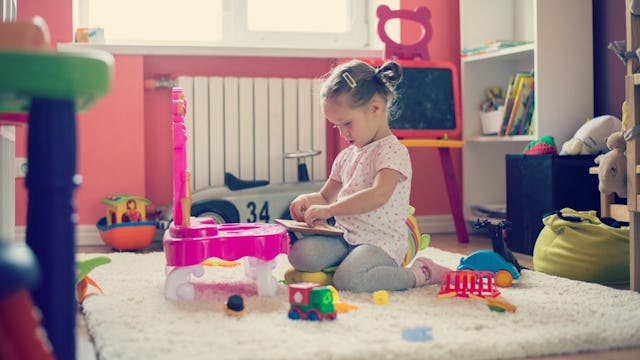Here's An Idea: Let's Stop Forcing Kids To 'Clean Up' All The Time

Consider this: If you had spent an hour hard at work, focused on something that meant a lot to you (writing, knitting, drafting a proposal, creating a spreadsheet, whatever it may be) and you were either close to being finished or completely in your “groove,” how would you feel if someone abruptly closed your laptop, took your pen, or stole your knitting needles and then told you to stop now and move on? A bit frustrated? Disrespected, perhaps? Reluctant and unwilling to comply?
Well, your child is no different.
Maria Montessori, Jean Piaget, even Mr. Rogers understood that “play is the work of childhood,” and it’s important that parents are able to embrace and appreciate this fact. A child considers play his “work.” Whatever they have created, built, modeled, or painted, whatever world, role, or scene they have curated, feels important to them. Their work is masterful and meaningful, in the same way that your brief, PowerPoint presentation, or new scarf feels important to you. Even more significant, your child’s work represents newly acquired skills and abilities. Maybe this was the first time they put the train tracks together themselves, or maybe they finally figured out how to stack those Magnatiles just so.
When we swoop in singing the universal “Clean Up Song” that every parent seems to know and declare play time to be over, we are essentially asking our child to abandon ship during a time when they may just be getting the helm under control. Stopping short or having to slam the breaks on creativity is understandably going to be difficult at times for any toddler — especially when it’s a toddler’s main ambition in life to feel in control — and you are usurping that need.
That said, playtime does eventually always have to come to an end — that is inevitable, but it’s also inevitable that our children may not always have to clean up. Sometimes, we can actually let them leave their toys and creations out. Sure, it may contribute to an already overflowing playroom. It may literally and figuratively add to our feelings of drowning in toys and clutter, and it may require that we have to go out of our way to walk around or over something treasured in our path. But when we do this, when we allow our child to preserve their “work,” we are sending a strong message of respect and appreciation for the time and effort they put into their project.
If you sense that your child may be reluctant to put their toys or projects away, acknowledge the importance of their work by telling them they do not have to clean up. Try saying things like this:
“You don’t have to clean up! You can save your work! Let’s leave it out!”
“Let’s put your name on your project [write it on a piece of paper] so that no one else can touch it!”
“You don’t have to put this away, but we do have to move it. Let’s find a safe place to put it together.”
“You can leave this out, but we have to take a break. You can come back to your work as soon as we do XYZ.”
“If you think you will want to leave this out, let’s set it up where we can close the door or where it won’t be in our way later.”
“You worked hard on this, let’s take a picture of it before we put it away.”
“We need to put part of this away, but we can leave some of it out — you choose which part to keep out.”
“Wow! This is such a special creation! Let’s find a place to hang/display it so that we can still see it.”
“We need to finish up playtime for now. Would you like to bring part of your creation/part of your toy with you?”
“It’s time for you to go, but I’m going to babysit/take care of/keep an eye on your toys. They will be safe.”
Being willing to tolerate and negotiate cleanup sends so many messages, and models so many of the essential behaviors and skills we want for our children to acquire, such as:
– The ability to be flexible
– To be okay with things not going our way
– To compromise
– To be respectful and appreciative
– To honor the time, thought, and effort that goes into making something special
Moreover, it demonstrates for our children that we don’t have to be in control all the time. We don’t always have to be the buzzkill that parenthood so often requires us to be. We can actually let some things go sometimes — an exercise that can feel foreign, and quite frankly, extremely difficult for a lot of parents.
And here is another benefit about letting your child not clean up every so often: Whatever transition takes place after playtime won’t feel as difficult because you’ve established a strong positive connection and sent an accepting and respectful message by allowing the toys to stay out. Once they are positively connected to you, their ability to move on improves, and the likelihood that they will be able to let his project go — and that you will actually be able to get it cleaned up — increases dramatically.
So try. Try not to insist that your child has to clean up all the time. It will mean so much to your child and show them that you really do respect their important “work.” Let them know that most of the time, it will be important to clean up, but sometimes you can bend the rules — sometimes you can let the mess reign and let their masterpiece steal the spotlight.
This article was originally published on